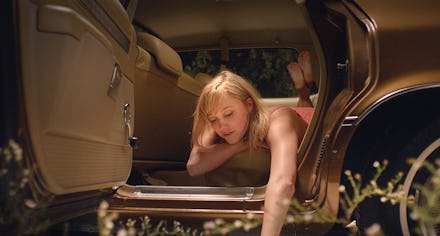'It Follows' Is the Scariest Movie About Adolescent Angst Ever Made

Go see this great new movie, they said. It'll be fun, they said.
Yet just five minutes into the harrowing prologue of the critically acclaimed new horror flick It Follows and I was cowering in my seat, digging my nails into my date's arm and wondering how, if ever, I would get this film out of my head. The second feature written and directed by David Robert Mitchell, It Follows is a terrifying riff on sex and growing up for the nostalgia-loving generation that makes The Conjuring look like a bedtime story.
This isn't the kind of film that requires spoiler warnings; the fear is slow-burning, and comes from the movie's central conceit rather than cheap twists or excessive gore. Our heroine is a 19-year-old woman named Jay (Maika Monroe), who acquires a sort of curse (the titular "It") after sleeping with her older boyfriend for the first time. Her dreamy, postcoital reverie about what she thought dating would be like when she was a little girl is interrupted when the aforementioned boy knocks her out, ties her to a chair and informs her that she will now be followed, relentlessly, by a malevolent shape-shifting force with no raison d'être apart from violently murdering her (cue the "sexually transmitted demon" jokes).
"It" can look like anyone, only Jay can see it and the only way to get rid of it is to pass it on by sleeping with someone else. Even then, if the next paramour is killed, the monster will again set its sight on Jay, and continue to go down the line of previous sexual couplings. In short, once you've been followed, you'll be looking over your shoulder for life.
Some critics have pointed out the film's arguably questionable sexual politics — "sex equals death" is indeed a well-worn horror cliche — but It Follows is more complicated than that. Perhaps the most obvious interpretation is that of a twisted take on sexual awakening. Sex is a rite of passage to adulthood, a social marker of childhood ended that can never be undone. Modern technology amplifies this sense of permanence, allowing indiscretions to haunt young people via things like social media.
The twist here, of course, is that sex also equals life. The cursed pass on their affliction by sleeping with someone else, who in turn can only escape by having more sex. Viewed cynically, the real "STD" is just the human condition: Life is a curse that ends inevitably in death, and the "cure," both for momentary distraction and potential biological immortality, is to sleep with someone else, starting the cruel cycle all over again.
Thus the central moral dilemma of the film — should Jay pass "It" on? — echoes broader philosophical questions set in motion at the dawn of adulthood: Practically, what to do with the rest of our lives? More broadly, what's the point when, as one of Jay's friend says, quoting Fyodor Dostoyevsky's The Idiot, you know "for certain that within an hour, then within 10 minutes, then within half a minute, now at this very instant – your soul will leave your body and you will no longer be a person"?
That recognition is a difficult one, and it's what informs It Follows' deeply unnerving sense of dread. In one scene, for example, two characters play a game called "trade," in which they look around a room and pick a person they'd like to swap lives with. One picks a little boy, saying he envies the way the child has his whole life ahead of him. To point out the fact that the character is himself only 21 and, in a non-movie universe, has most of his life ahead of him as well ignores the angst of the realization, occurring typically at the tail end of adolescence, that childhood innocence has irrevocably left you.
Fittingly, the entire film is awash with nostalgia. Its muted colors, its nods to both '80s teen cinema and slasher flicks of yore and its technology that is in turn clunky and futuristic make it impossible to place It Follows within a specific era. Nothing lasts forever, the movie seems to say, and the comforting distractions of youth — like lazy dips in a pool, sleepovers, childhood crushes and the sleepy haze of late summer in suburbia — can't protect the characters from the creeping end for long. The "It" of the film is a sort of nihilism on legs, given no motive nor origin story, no cliched violent trauma that explains its malevolent existence. It is, at its core, an urgent manifestation of the unbearable heaviness of growing up.
That also makes it an especially timely film for the age of vintage photo filters and '90s listicles, though the film eschews the cool, pessimistic detachment of something like True Detective in favor of sheer existential panic.
Though not quite as cruel to its audience as something from the oeuvre of Lars Von Trier or Michael Haneke, It Follows uses the defamiliarization of the mundane to profoundly upsetting effect. And while aesthetically beautiful, the things that make It Follows a superb horror movie also make it hard to watch. Many horror films are like roller coasters, in that they're frightening in the moment but couched in the satisfying assurance of safety and control; things that go bump in the night don't really exist. We leave the theater flushed with cathartic adrenaline, and however much we root for our heroes and heroines, we're thankful it's not our life playing out on screen.
Not so here. It Follows will follow you, because it taps into a primordial fear of the unknown, and growing up, that follows us all.